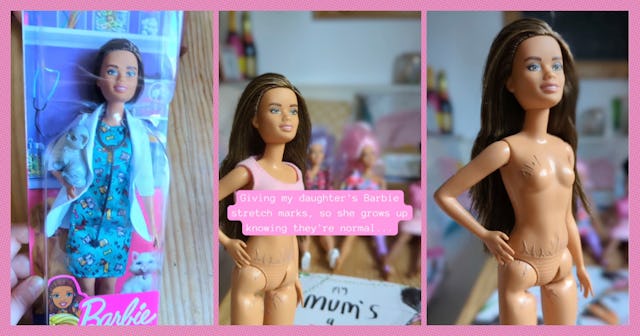This Mom Painted Stretch Marks On Her Daughter's Barbie Doll To Normalize Real Bodies
Her creative decision sparked some debate.

Thanks to the Barbie movie, which comes out this Friday, and the media blitz that has ensued ahead of its release, the classic kid’s toys is having a resurgence. I, for one, am so stoked about this comeback, especially as a former Barbie lover with a 4-year-old kid entering the perfect age for doll play.
Though Mattel has worked to make their dolls way more inclusive, there are still some features on a Barbie doll that have pretty much remained the same since its inception, like perfectly flawless skin.
But mom Kate Claxton wanted to show her daughter that Barbie can also have stretch marks, just like millions of women in the world.
Claxton, an award-winning children's author of inclusive, body positive picture books, is showing her three-year-old daughter that there are different bodies using Barbies. She took one of her daughter’s dolls and drew some stretch marks on the doll’s stomach and legs with nail polish.
“I am very excited for the new Barbie movie and we have some gorgeous body-inclusive dolls at home, but none with stretch marks...until now!+🐯” she wrote in the caption on her Instagram video featuring the making of this new stretch mark Barbie.
“You know how much I LOVE normalising these little tiger stripes on our skin, and My Mum's a Tiger does a hell of a job of that, but my daughter is SO into dolls and getting them dressed and undressed at the moment that it was important for me to make some modifications to this gal and give her the stripes so many of us cover up ✌️+,” she wrote.
She then quotes the children’s book she wrote by saying, “‘Let's take what makes us different and instead of trying to hide, let's be more like animals and wear our marks with pride.’ My fave line from the book and perfect for Vet Barbie 🐯+Who thinks @barbie should add stretch marks to some of their dolls permanently? 🤔”
Stretch marks are remarkably common. An estimated 50% to 90% of all people who are pregnant develop them. Stretch marks are also common for growing teen girls and boys.
When she shared a video of her stretch mark-adorned Barbie, the post went viral with several followers noting how genius and important this idea is.
“Love this! I am one of those who are guilty of hiding my stretch marks but your wonderful book and posts always remind me of why I’ve got those tiger stripes ❤️” one user wrote.
Other users were not-so-into Claxton’s modification, mainly moms, it seems, who have never, ever had one single stretch mark in their whole life.
“Why make girls worry more all the time!” one person wrote in a comment highlighted by Claxton. “I had 3. No stretch marks. Make them think positive.”
Another echoed, “Why make young girls worry more about [their] bodies? I’ve got no stretch marks, so maybe be better if you teach them about being positive not negative about [their] bodies?”
How could one look at the work that Claxton is doing to break generational cycles around body image and see this as a negative thing? Why are stretch marks automatically negative to them? Imagine being so close to the point and then just completely missing it.
When asked how her daughter reacted to the “tiger stripes,” Kate said her three-year-old was more interested in her doctor outfit.
“My pure-hearted baby. ‘Wow, she's a doctor! She has a telescope’ (meaning stethoscope). I got Vet Barbie dressed again before I gave her to E, and she couldn't give two sh*ts about the marks, she's just excited she has a cool job. I'm doing my job and I'll put money on you lot doing yours too,” she wrote in a follow-up post.
Her daughter’s sweet reaction further proves the point that children do not care about appearances, and appreciate diversity if it’s presented to them in a positive light from a young age. After all, the idea of criticism and toxic body culture is taught. Claxton is working to undo all that.
“Some people are acting like I've stolen my daughter's childhood,” Claxton told Scary Mommy, “but this is one of many dolls amongst her princesses, fairies and superheroes. One doll that normalizes a different kind of skin to all the other dolls. Stretch marks can appear as early as 9 or 10 through growth spurts, why wouldn't I want her to see them as nothing to worry about.”
Mattel, the manufacturer of Barbie, has already made a few inclusive changes to their Barbie line-up. They feature dolls of different professions, ethnicities, disabilities, and body types. However, Claxton’s highlight of a Barbie with stretch marks may serve as a reminder that there is still a lot of work to do when it comes to representation.